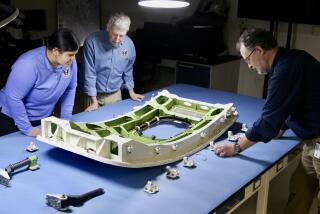Different Routes to the ‘Green’ Car
The world’s major automakers are tempering their enthusiasm for hydrogen-powered fuel cells to solve the environmental and geopolitical problems caused by dependence on gasoline.
Instead, as a three-day “green car” conference sponsored by French tire maker Michelin Group wrapped up here Thursday, representatives of the major automakers said redesigned diesel engines, hybrid gas-electric cars and several alternative fuels would be the short-term answer to reducing emissions and cutting gasoline use.
“No one has a silver bullet that will cure everything,” said David Hermance, executive engineer for environmental engineering at the Toyota Motor Co. research and development unit in Torrance.
Automakers have been trying numerous possibilities: Cleaner-burning gasoline engines; hybrids, which Toyota and Honda Motor Co. already have on the market; various diesels designed by European automakers; and battery-powered vehicles.
Scores of auto industry executives, government regulators and environmentalists gathered this week for the fifth Michelin Challenge Bibendum.
The green car event drew more than 100 alternative-fuel and low-emission cars, trucks and buses that were on display from the U.S., Europe and Asia. Notably absent, however, were the long-awaited hybrid version of the Ford Escape SUV and a Dodge hybrid pickup.
The Challenge grades the vehicles’ performance in more than a dozen tests, from styling and handling to fuel economy and emissions.
And while the tests are being run, industry executives make the rounds, gathering information on complementary and competing technologies. One big message is that backers of diesel technology, principally European car makers and suppliers such as Germany’s Robert Bosch, believe the time is ripe to reintroduce diesel passenger vehicles in the U.S.
“We believe that diesel can help this country reduce its oil dependence” because new diesel engines get 25% to 40% better mileage than their gasoline counterparts, said Kurt Liedtke, chief executive of Bosch’s U.S. operation in Michigan.
Bosch, which makes diesel fuel systems for Mercedes-Benz, BMW and other carmakers, also believes that the industry will be able to develop the necessary filters and catalytic converters so diesels can meet tough emission standards that take effect in the U.S. in 2007.
Meanwhile, Asian automakers have invested the bulk of their research in hybrid technologies. And hybrid gas-electric cars and cleaner-burning gas-powered cars now sold by Toyota, Honda and Nissan Motor Co. are among the least polluting on the road.
Of 16 Bibendum gold medals, 14 went to Honda, Toyota and Nissan. Cars from Ford Motor Co.’s Volvo subsidiary won the remaining top emissions awards.
One major winner was the redesigned 2004 Toyota Prius gas-electric hybrid, which not only took an emissions award but also captured top honors for design and technology integration. Toyota introduced the Prius in Japan in 1997 and the U.S. in 2000.
The company already has received 9,400 orders in the U.S. for the new model, which won’t be available at dealerships until next month. Toyota believes it can sell more than 36,000 of the hybrid vehicles worldwide next year.






